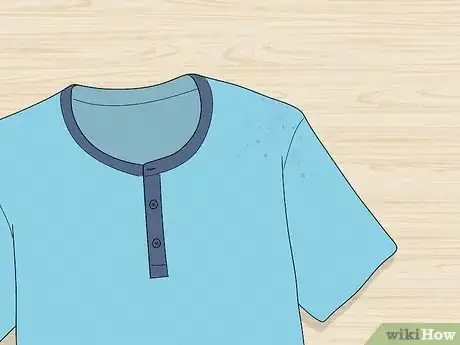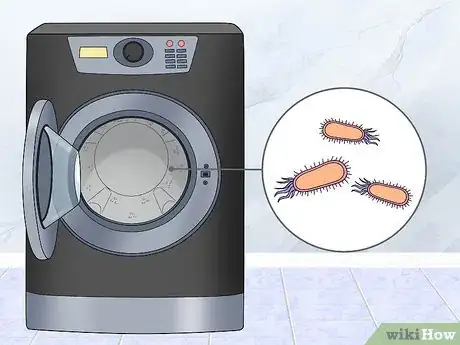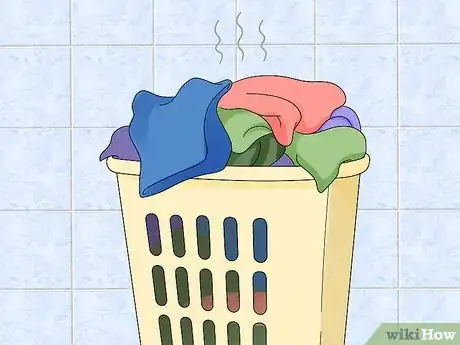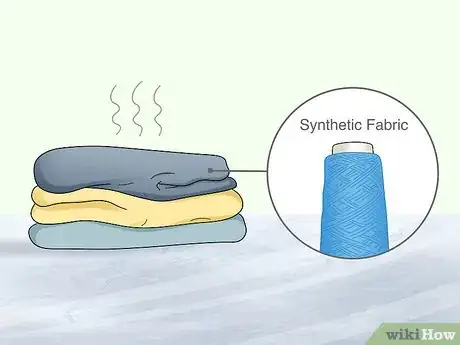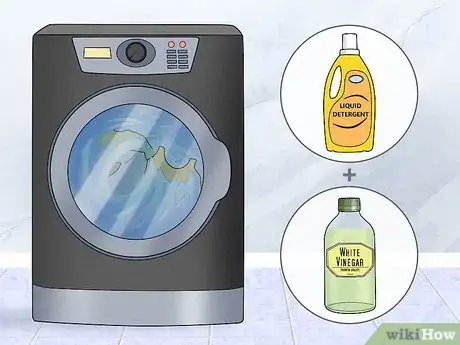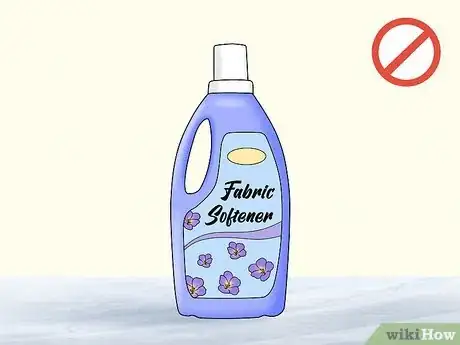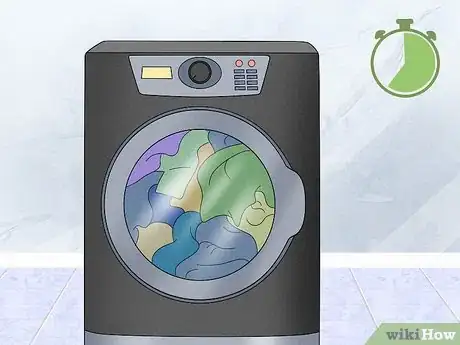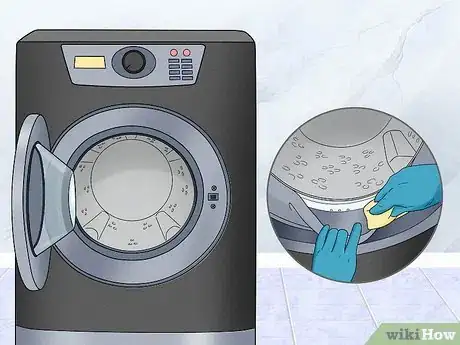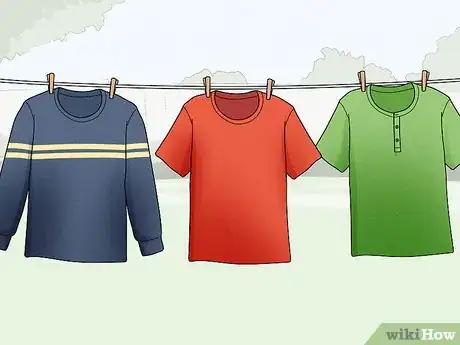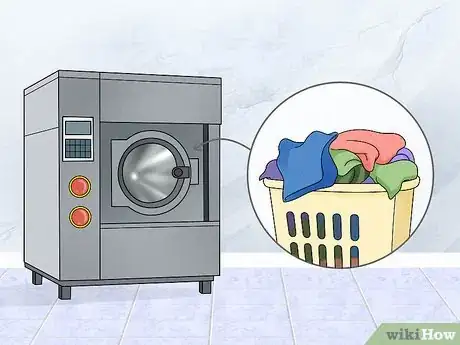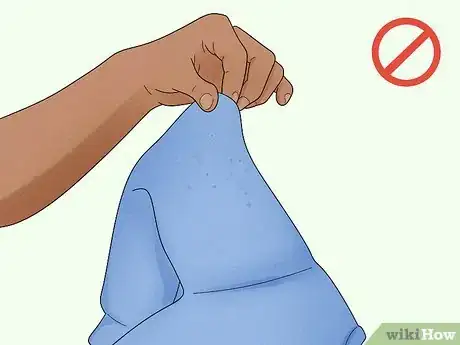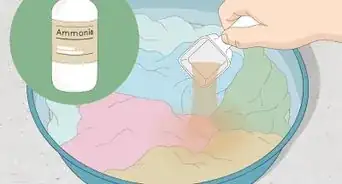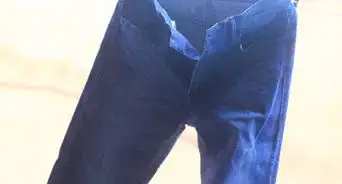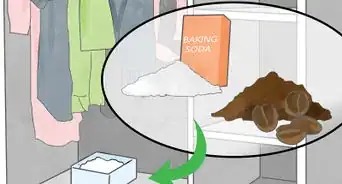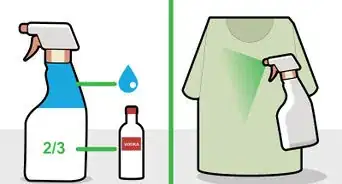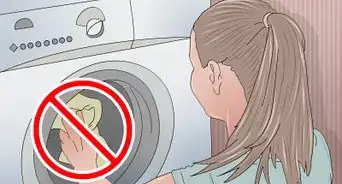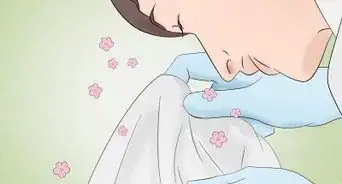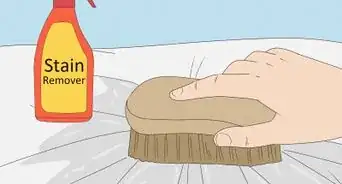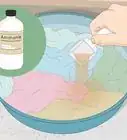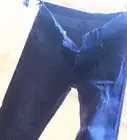This article was co-authored by Susan Stocker and by wikiHow staff writer, Eric McClure. Susan Stocker runs and owns Susan’s Green Cleaning, the #1 Green Cleaning Company in Seattle. She is well known in the region for outstanding customer service protocols — winning the 2017 Better Business Torch Award for Ethics & Integrity —and her energetic support of green cleaning practices.
There are 8 references cited in this article, which can be found at the bottom of the page.
This article has been viewed 61,912 times.
If you’ve ever forgotten to bring a change of clothes with you to the gym or you’ve accidentally left a load of damp clothes in the washing machine overnight (and let’s be honest, who hasn’t?) then you know that musty smell. This stale, damp odor is often mildew, which is caused by a combination of bacteria, sweat, and moisture. Luckily, there are plenty of ways that you can get rid of that smell, and the odds are high that once you fix the underlying problem, this shouldn’t come up in the future.
Steps
What is that musty smell on clothes?
-
1It’s usually a combination of bacteria, sweat, and oil. Anyone who hits the gym regularly might recognize this odor on their workout gear, even after they’ve washed it. Your clothes pick up any sweat and natural body oils, so when you work out, your clothes absorb a ton of microbes and odors. If given enough time, all of that stuff in your clothing’s fiber will create a musty odor.[1]
- This kind of musty odor will typically come out after a wash, but if you don’t wash your clothes fast enough or your washing machine isn’t clean, it can settle into the fabric and become much harder to get out.
-
2If your fresh laundry smells musty after it dries, that’s mildew. If there’s bacteria, sweat, and oil caked into your clothes, and they get wet without drying out all the way, that damp mixture can turn into mildew. Basically, a microscopic fungus starts growing in your clothes. Unfortunately, mildew tends to stick to your washing machine, so you may need to clean your washing machine to keep it from spreading to other clothes.[2]
- This can happen if you accidentally forget to move your clothes from the washer to the dryer, your washing machine or dryer aren’t clean, or your clothes sit in the hamper for too long.
Why won’t that smell go away?
-
1Your washing machine could be harboring the odor-causing bacteria. Open your washing machine when it’s dry and empty, and take a sniff. Does it have a damp, moldy odor? If so, your machine is to blame.[3] If your machine has a self-clean function, try that first. If not (or if the self-clean doesn’t do the trick), run an empty cycle with warm water and pour in 2 cups (470 mL) of distilled white vinegar. If that doesn’t work, scrub the drum by hand with vinegar and water using a sponge.[4]
- You may need to do this multiple times to fully get rid of the bacteria and fungus causing that smell.
- Your dryer could be harboring the bacteria as well, although it’s typically the washing machine to blame on this one.
-
2Your hamper could be keeping that mustiness around. If you toss your sweaty, dirty clothes in a hamper and the fabrics sit there for too long, all of the moisture could contribute to the growth of mildew. To prevent this, turn your clothes inside out and let them sit out in the open air for a few hours before you put them in the hamper. Even better, skip the hamper altogether and hang or lay out your dirty clothes until you’ve got a full load of laundry on your hand.[5]
- If you are short on space and you do need to use a hamper, no problem. So long as you air the clothes out for a bit before putting them in the hamper, you should curb that odor dramatically.
-
3That musty odor tends to stick around on synthetic fabrics. Cotton clothing tends to be very breathable, but synthetic fibers, like nylon, have a much harder time airing out. If this must is only developing on your workout gear, get a specialty detergent designed specifically for athletic wear and wash your synthetic workout clothes separately.[6]
- You can pick up a specialty detergent designed for synthetic athletic wear at most big box general stores.
- Traditional detergent is designed for cotton clothing, and it’s not going to get any caked-in scents out of your synthetic gear, but specialty detergent will!
How do I get rid of that musty smell?
-
1Re-wash your clothes with vinegar. Load your clothes in the washing machine, add a standard amount of mild detergent, and turn the dial to the hot water setting. Add 1–2 tsp (4.9–9.9 ml) of white vinegar to the detergent drawer to deodorize your clothes and run the cycle.[7]
- The hotter the water, the faster that bacteria and sweat will dissolve out of the clothing fiber.
-
2Dry your clothes immediately once you’re done re-washing. After the wash cycle is over, line dry your clothes outside to completely prevent that smell from developing. If this isn’t practical, get your clothes in the dryer immediately after the wash cycle is over and dry the clothes on a higher heat setting than you’d normally use.[8]
- If the smell still isn’t out, wash the clothes with only white vinegar, then run another cycle with just 1 cup (230 g) of baking soda before drying.[9]
-
3Stop using fabric softener, deodorizers, or heavily perfumed detergents. Fabric softener, non-vinegar-based deodorizers, and strong-scented detergents will mask the musty smell, but they won’t remove it. In fact, the residue from these products can actually make the moldy aroma worse. Always wash your clothes by using the recommended amount of a mild detergent, or try washing your clothes with white vinegar.[10]
- Fragrance-free detergent is likely going to get your clothes cleaner than any scented detergent, even if your clothes don’t smell as fresh!
- A lightly-scented lemony detergent is probably going to be fine, but that super potent ginger-mango-lavender stuff is probably going to make it harder to get that odor out.
Why do my clothes smell after drying?
-
1Your dryer may be dirty, so clean it to remove any residual odors. Your dryer can pick up any lingering scents from the washing machine, so cleaning the drum may solve this! Unplug the dryer to avoid shocking yourself. Dip a cloth in some soapy water and thoroughly wipe down the drum of your machine. Let it air dry with the door open for a few hours before plugging your dryer back in.[12]
- This may keep your next load of laundry from coming out musty.
-
2Line-drying your clothes should keep mildew from developing. The dryer locks a lot of humidity and moisture into your clothes early on in the dry cycle, but air drying your clothes outside will prevent any mustiness from developing.[13] The ultraviolet rays from the sun will even help disinfect any of that mildew bacteria. If possible, always line dry your clothes outside for best results![14]
- If it’s too cold out for this or you don’t have the room, then don’t worry about it. So long as you dry your clothes quickly once the wash cycle ends and your washing machine and dryer are clean, you shouldn’t have a problem with this musty smell.
Expert Q&A
-
QuestionHow can I get a mildew stain out of clothing?
 Dario RagnoloDario Ragnolo is the Owner and Founder of Tidy Town Cleaning, a home cleaning service in Los Angeles, California. His business specializes in residential & commercial cleaning. He is a second generation home cleaning expert, who grew up around his parents cleaning business in Italy.
Dario RagnoloDario Ragnolo is the Owner and Founder of Tidy Town Cleaning, a home cleaning service in Los Angeles, California. His business specializes in residential & commercial cleaning. He is a second generation home cleaning expert, who grew up around his parents cleaning business in Italy.
House Cleaning Professional Use a solution of Tile laundry detergent and hot water. Let it soak for a minute or two and then use a toothbrush to brush the stain away.
Use a solution of Tile laundry detergent and hot water. Let it soak for a minute or two and then use a toothbrush to brush the stain away. -
QuestionIs mold in my basement dangerous?
 Dario RagnoloDario Ragnolo is the Owner and Founder of Tidy Town Cleaning, a home cleaning service in Los Angeles, California. His business specializes in residential & commercial cleaning. He is a second generation home cleaning expert, who grew up around his parents cleaning business in Italy.
Dario RagnoloDario Ragnolo is the Owner and Founder of Tidy Town Cleaning, a home cleaning service in Los Angeles, California. His business specializes in residential & commercial cleaning. He is a second generation home cleaning expert, who grew up around his parents cleaning business in Italy.
House Cleaning Professional Yes. It all depends on what your sensitivity is to it, but in terms of your health, it's not good for you. Inhaling it is especially problematic, so this isn't an issue you should ignore for too long.
Yes. It all depends on what your sensitivity is to it, but in terms of your health, it's not good for you. Inhaling it is especially problematic, so this isn't an issue you should ignore for too long. -
QuestionWhat does black mold smell like?
 Susan StockerSusan Stocker runs and owns Susan’s Green Cleaning, the #1 Green Cleaning Company in Seattle. She is well known in the region for outstanding customer service protocols — winning the 2017 Better Business Torch Award for Ethics & Integrity —and her energetic support of green cleaning practices.
Susan StockerSusan Stocker runs and owns Susan’s Green Cleaning, the #1 Green Cleaning Company in Seattle. She is well known in the region for outstanding customer service protocols — winning the 2017 Better Business Torch Award for Ethics & Integrity —and her energetic support of green cleaning practices.
Green Cleaning Expert In my experience, it smells kind of like soil and rotting leaves. It's definitely a unique odor. If you think you have black mold in your laundry room, you must contact a professional. That's not a DIY job.
In my experience, it smells kind of like soil and rotting leaves. It's definitely a unique odor. If you think you have black mold in your laundry room, you must contact a professional. That's not a DIY job.
References
- ↑ https://www.nbcnews.com/better/lifestyle/how-get-smell-out-gym-clothes-ncna1050011
- ↑ https://www.apartmenttherapy.com/how-to-get-mildew-smell-out-of-clothes-36753259
- ↑ https://www.apartmenttherapy.com/how-to-get-mildew-smell-out-of-clothes-36753259
- ↑ https://www.bhg.com/homekeeping/laundry-linens/tips-checklists/how-to-clean-washing-machine/
- ↑ https://www.nbcnews.com/better/lifestyle/how-get-smell-out-gym-clothes-ncna1050011
- ↑ https://www.nbcnews.com/better/lifestyle/how-get-smell-out-gym-clothes-ncna1050011
- ↑ Susan Stocker. House Cleaning Professional. Expert Interview. 8 November 2019.
- ↑ https://www.apartmenttherapy.com/how-to-get-mildew-smell-out-of-clothes-36753259
- ↑ https://www.apartmenttherapy.com/how-to-get-mildew-smell-out-of-clothes-36753259
- ↑ https://www.apartmenttherapy.com/how-to-get-mildew-smell-out-of-clothes-36753259
- ↑ https://www.apartmenttherapy.com/how-to-get-mildew-smell-out-of-clothes-36753259
- ↑ https://www.bhg.com/homekeeping/laundry-linens/products/clothes-dryer-care/
- ↑ https://www.nbcnews.com/better/lifestyle/how-get-smell-out-gym-clothes-ncna1050011
- ↑ https://www.apartmenttherapy.com/how-to-get-mildew-smell-out-of-clothes-36753259
- ↑ https://extension.missouri.edu/publications/gh5928
- ↑ https://www.epa.gov/mold/what-difference-between-mold-and-mildew
- ↑ https://www.betterhealth.vic.gov.au/health/conditionsandtreatments/mould-and-your-health
- ↑ https://www.betterhealth.vic.gov.au/health/conditionsandtreatments/mould-and-your-health

